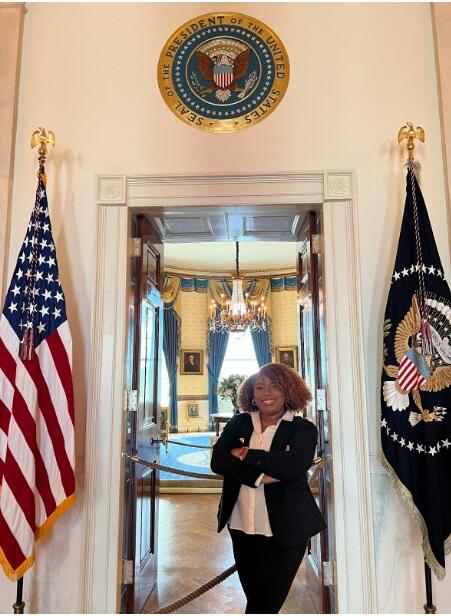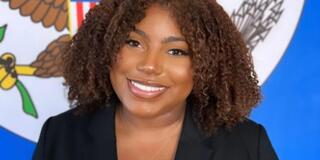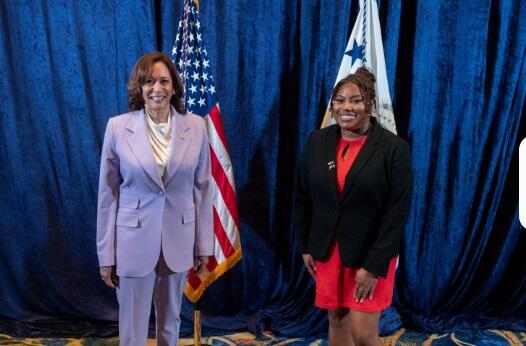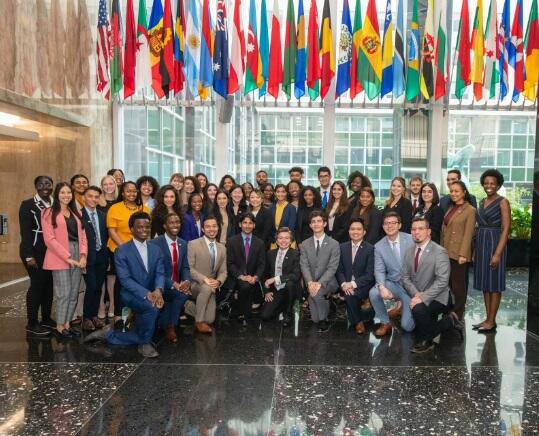
Diplomatic Fellowship Spotlight: Akaysha Palmer (Charles B. Rangel Fellowship)

This blog is part of an ongoing series of Foreign Service Fellow spotlights. This post highlights Akaysha Palmer, a current Rangel Fellow and second-year SIPA student. If you are not familiar already with the Diplomatic Fellowship Fellowships, I strongly recommend you keep reading to learn more about how you can become an American diplomat AND get your graduate studies paid for.

Can you introduce yourself?
My name is Akaysha Palmer, a 2024 Charles B. Rangel Graduate Fellow, from the Bronx, New York, and am a proud first-generation Jamaican-American. I am a second-year graduate student at SIPA, pursuing a Master's in Public Administration, concentrating in Urban and Social Policy with specializations in Technology, Media, and Communications. Prior to SIPA, I obtained my Bachelor of Science from Seton Hall University in Diplomacy and International Relations. I have participated in the Public Policy and International Affairs Junior Summer Institute at Princeton University and interned at the U.S. Mission to the United Nations, Office of the Mayor of NYC, House of Foreign Affairs Subcommittee on Africa, Global Health, and Global Human Rights, and the U.S. Embassy in Nassau, The Bahamas. Each of these experiences deepened my interest in serving as a U.S. Diplomat.
What led you to join the Foreign Service? Why did you choose to pursue a career in international public service?
My passion for public service started when I interned and volunteered at a soup kitchen in Harlem, NY called the NY Common Pantry where I interacted with several low-income and homeless individuals in need- learning more about their often-forgotten humanity. This spark was further ignited after a service-learning trip to Medellin, Colombia where I learned more about the rich history of the city, their commitment to advancing the SDGs, and was fully immersed in their culture. The language barrier prompted me to learn Spanish and see languages as a way to bring people together. I like to say that these two experiences married each other and pushed me to seek a career in public service. I learned the importance of dialogue and cultural exchange, something that I hold dear to me today. While studying in college, I noticed that many of my peers did not look like me, and as time passed I realized that this was not a very diverse field. I struggled with finding my place until other diplomacy students and I founded the Black Diplomacy Student Organization at Seton Hall University to provide more safe spaces and support for students of color. I chose to pursue a career with the Foreign Service to not only address issues that I am passionate about but to provide representation to and open doors for other people of color like myself- eager to enter spaces not typically designed for them. I hope to continue to pay it forward one day, as all of the Black Diplomats who came before me have.
How was your summer abroad experience in the U.S. embassy in Nassau?
Interning in the Public Affairs Section at the US Embassy in Nassau, The Bahamas showed me the importance of this career field and the work done every day. It put things into perspective for me in a way I had never experienced before, showing me the firsthand experience of cultural diplomacy and cross-communication. Being at a smaller embassy, not only did I work with a wonderful team of people, but I also met many people during my internship. I am grateful for the hands-on experience gained while supporting the visit of the U.S. Vice President Kamala Harris, rower Arshay Cooper, celebrating the 50th Anniversary of the US-Bahamas bilateral relationship, and even assisting with various Pride Month events during June, in Nassau. My supervisor was also intentional in ensuring that I worked on projects across sections at the embassy, not only limited to Public Affairs. Being the youngest in the office and one of the few African-American women, I also realized the importance of representation and how I would contribute to showing others the diversity of the US. I must attribute much of my wonderful experience to the local staff that took me in as their own and showed me around their beautiful country. They were always there to answer my questions, bring me fresh fruit from their gardens, and made me feel like family.
What was the application process like for the Foreign Service Fellowships?
Being from the Bronx, New York, and a first- generation American, I had no idea what the foreign service was while growing up. My family primarily works in the sciences and medical field, so I was the first person to choose a very different career path, influenced by my exposure to internships in high school and college. Needless to say that it was not until I started college and studied diplomacy and international relations that I became more exposed to the career opportunities. Seton Hall’s resources allowed me to learn more about the opportunities in this field, along with the mentors acquired over the years, some of them my own peers. After interning at the US Mission to the United Nations, and completing the PPIA (Public Policy and International Affairs) Program at Princeton University, my interests in the U.S. Foreign Service grew deeper. This led me to attend several graduate school fairs where I also learned more about different fellowships and ways to gain financial support for advanced degrees. After several information sessions and connecting with other fellows, the U.S. Foreign Service seemed like the opportunity of a lifetime. Once the application came out, I reached out to my undergraduate institution where I was able to gain support with my application materials, and connect with another fellow from two classes above me. It is a challenging application process as many materials are needed, like letters of recommendation, a personal statement, etc. but it is important to lean on those that you can for support- whether that be mentors, current fellows, or university faculty. After applying, you are notified if you become a finalist, and if so, complete a writing exercise and personal interview. Shortly after the interview, you are notified of your selection. The process can be very nerve wracking as you anticipate results, but the best candidates are those who are passionate about this field of work, and any opportunity that is meant for you will always be for you. My best advice to anyone interested in this career is to take a chance, apply, and see where it takes you. Even if you are not selected the first time around, you can always apply again- have faith in yourself.
Why did you choose SIPA? What other graduate programs were you considering?
After considering programs in Washington, DC, I chose SIPA because of its location in New York City, and a campus that feels like home. I wanted to pursue a master’s in public administration, to pair with my degree in international relations and expand my knowledge of policy. I made my decision after visiting different schools that had amazing programs, but just did not feel like the program or place for me. SIPA’s courses, Columbia’s greenery, and the school’s diversity, allowed me to see myself there for the next two years. I also learned that the school had a newly founded Black Student Union, committed to fostering an inclusive environment and support system at SIPA, much like the BDSO I founded in college. After being at SIPA for the past two years, I can honestly say that I am happy with my decision, between the supportive and encouraging professor’s I have had, the wonderful friends I have made, my encouraging peers, and the resources that the deans at the Office of Student Affairs have provided to me. Being at a school with many international students has allowed me to connect with people from all over the world. As a New York City native, studying at SIPA has also given me a chance to romanticize the city in a way that I haven't been able to before.

What have you enjoyed the most about being a Rangel Fellow?
Being a Rangel Fellow has given me the opportunity to connect with like-minded people from diverse backgrounds, committed to making an impact in the world. It has been a blessing to find community within my cohort and the fellows who have come before and after me- one that I do not take for granted. The State Department is not the most diverse agency, but each of us bring more representation to these spaces and are able to provide that same representation to the other people that we meet and places we will go. Furthermore, being a fellow has also given me the opportunity to give back, as I have been able to assist other fellows with their selection into the fellowship, review materials for them, and pay it forward-cas those before me have assisted me in my journey.
What advice do you have for prospective applicants interested in applying to Rangel and SIPA?
My advice to applicants interested in applying to Rangel and SIPA is to go for it! New beginnings and opportunities can be both scary and exciting, but you will never know where it will take you unless you try. I also encourage people to learn more about the career and lifestyle, as the Foreign Service is a unique career opportunity. As a fellow, you are supported financially through graduate studies, gain a cohort of new people, and are given the chance to learn more about and address global issues. If you have any questions about the application process, or want to learn more about my experience please reach out to me @[email protected].
What are you looking forward to the most this year?
This year, I am looking forward to the end of one journey and the start of another, a bittersweet feeling. I am excited to graduate and celebrate my accomplishments but I will definitely miss all of the experiences and people I have met during my time at SIPA. After graduation I will move to Washington, D.C. and join the Orientation class for incoming foreign service officers in July and later on this year will find out where I will be posted overseas. In this season of transition, I am embracing the changes- both known and unknown- and looking forward to where life will lead me. Nonetheless, I am grateful for it all!
